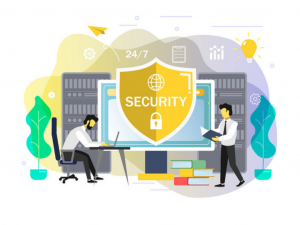THE BENEFITS OF ARTIFICIAL INTELLIGENCE
December 3, 20205 TRENDS SHAPING THE LEGAL INDUSTRY VIEW POINT IN 2021
December 7, 2020 Many law firms have a website. Websites are a must in the 21st century, same way website hack is of the increased as well.
Many law firms have a website. Websites are a must in the 21st century, same way website hack is of the increased as well.
As a result of the relevance and importance of websites, they are also targets of hacks. A website is important but protecting your website from malicious attempts is even more paramount. Repairing a hacked website is very difficult. It’s time-consuming and expensive.
And hackers normally leave a hidden entry point. This allows them to keep coming back and re-hacking your site. Detecting such hidden entry points is very hard.
It is the worst nightmare for any business owner.
Hackers use your server as an email relay for spam, or to set up a temporary web server, normally to serve files of an illegal nature. Now, apart from losing access to your website, your website will be flagged by google which will harm your overall score on google. Which is everything we don’t want?
Using free themes and plugins can cause malware or hacking of your website.
Why?
According to security boulevard, outdated software has vulnerabilities. So when WordPress administrators use outdated core, plugins, themes, and other software they expose security holes for hackers to exploit.
Unfortunately, they do so quite often; outdated vulnerable software is one of the most common causes of hacked WordPress websites
Updating plugins and current themes regularly.
Also, when site owners don’t update their site and keep using outdated WordPress plugins and themes, their site becomes vulnerable to hacks.
Hackers actively seek out vulnerable plugins and themes on WordPress sites and exploit them.
In order for you not to experience such a malicious nightmare from a malicious set of individuals, I will list out five steps on how to protect your website from attack.
- Change the password and username of your website login details.
Websites come with the default name “admin”. As the username. This should be the next step after setting up your website. Change the username and your password to configurable names. Chrome gives password suggestions.
If you are confused as to what strong names to use, you can use the chrome suggestion. You don’t need to remember it, chrome does a great job of saving your passwords.
- Avoid using public WiFi.
These wifis are not secured and make you susceptible to cyber attacks. Avoid logging into your account, updating passwords, or using it to do any administrative work. Use your personal WiFi and also don’t log in to other PCs with your details.
- Use HTTPS
We have left the era of choosing between HTTP or HTTPS. Now google enforces a secure channel. If you try to browse an insecure site chrome will send a message, asking you to go back to safety. Apart from you losing traffic, you are on the good books of google if your website is encrypted. Get an SSL certificate, it will save you unnecessary headaches.
- Use Security plugins on your website.
You have an SSL certificate on your website, plus you have changed your website password and username, now it’s time to take it a notch further. By using security plugins on your website. If you are using WordPress, WordFence, Securi are great options for your websites. By adding this level of security protects your websites from potential malicious attacks. And these plugins are recommended by WordPress. Use them for your website safety.
- Implementation of 2 Factor Authentication
Now you have secured your end, you need to make sure the end of your users is secured as well. By enforcing 2-factor authentication, hackers can’t pretend to be a user.
An authentication code is sent to the user thereby defeating the very purpose of hacking the website. As you protect your end, enforce strict rules on your users. Strong passwords and 2-factor authentication.
With these 5 top tips, your website will be far from the prying eyes of malicious persons. And you won’t need to spend money on retrieving your website or getting in trouble with search engines.
Stay safe and keep your website safe.
[Original article: https://ivendigital.com/how-to-avoid-website-hacks/]

